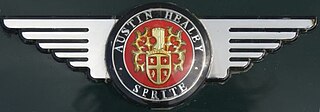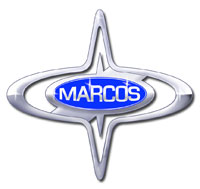
A kit car is an automobile available as a set of parts that a manufacturer sells and the buyer then assembles into a functioning car. Usually, many of the major mechanical systems such as the engine and transmission are sourced from donor vehicles or purchased new from other vendors. Kits vary in completeness, consisting of as little as a book of plans, or as much as a complete set with all components to assemble into a fully operational vehicle such as those from Caterham.

The Mini is a small, two-door, four-seat car produced by the British Motor Corporation (BMC) and its successors, from 1959 until 2000. Minus a brief hiatus, original Minis were built for four decades and sold during five, from the last year of the 1950s into the last year of the 20th century, over a single generation, as fastbacks, estates, and convertibles.

Reliant Motor Company was a British car manufacturer based in Tamworth, Staffordshire, England. It was founded in 1935 and ended car production in 2002, the company had been known as "Reliant Motor Company" until the 1990s when it became "Reliant Motors" and then finally became "Reliant Cars LTD" after production had ended of the Robin as the company was restructured to be a car import business. It is now a dormant company and the only entity left is a separate parts company created called "Reliant Partsworld" which produces parts for Reliant vehicles.

The Austin-Healey Sprite is a small open sports car produced in the United Kingdom from 1958 until 1971. The Sprite was announced to the press in Monte Carlo by the British Motor Corporation on 20 May 1958, two days after that year's Monaco Grand Prix. It was intended to be a low-cost model that "a chap could keep in his bike shed", yet be the successor to the sporting versions of the pre-war Austin Seven. The Sprite was designed by the Donald Healey Motor Company, with production being undertaken at the MG factory at Abingdon. It first went on sale for £669, using a tuned version of the Austin A-Series engine and as many other components from existing cars as possible to keep costs down.

Marcos Engineering was a British sports car manufacturer. The name derives from the surnames of founders Jem Marsh and Frank Costin.
The AEM Scout was a Welsh-built Mini Moke type utility vehicle, with, zinc-coated bodywork and totally different styling not to mention the radically different method of production. It was made for only one year, 1987, in Merthyr Tydfil, South Wales. The running gear was based on the Mini, with a Mini engine, transmission, front subframe and Hydragas suspension.

The Triumph Herald is a small two-door car introduced by Standard-Triumph of Coventry in 1959 and made through to 1971. The body design was by the Italian stylist Giovanni Michelotti, and the car was offered in saloon, convertible, coupé, estate and van models, with the latter marketed as the Triumph Courier.

The Mini Moke is a small, front-wheel-drive utility and recreational convertible, conceived and manufactured as a lightweight military vehicle by British Motor Corporation (BMC), and subsequently marketed for civilian use under the Austin, Morris, Leyland, and Moke brands. The name "Mini Moke" combines mini with moke, an archaic term for a mule. The Moke is known for its simple, straightforward, doorless design; and for its adaptability.

The Citroën Méhari is a lightweight recreational and utility vehicle, manufactured and marketed by French carmaker Citroën over 18 years in a single generation. Built in front-wheel (1968–1988) and four-wheel drive (1980–1983) variants, it features ABS plastic bodywork with optional/removable doors and foldable, stowable, fabric convertible top.

Gilbern, Gilbern Sports Cars (Components) Ltd , was a Welsh car manufacturer from 1959 to 1973, based in Llantwit Fardre, Pontypridd, Glamorgan, Wales.

The Unipower GT is a British specialist sports car that debuted at the January 1966 Racing Car Show. It uses the powertrain from the BMC Mini mounted amidships. Production lasted until the end of 1969.

Mini-Z is a brand name for a popular line of 1:28-scale electric radio-controlled cars manufactured by Kyosho Corporation, a Japanese manufacturer of various radio-controlled devices. Kyosho makes a huge number of bodies for the Mini-Z. The wheelbase can range from 86mm to 106mm. The bodies are all highly detailed, realistic looking, and fully painted with a high gloss paint. The bodies are so realistic that many are collected as display models and the bodies come with a dummy chassis and wheels for display purposes.
Fiberfab was an American automotive manufacturer established in 1964. Starting with accessories and body parts, they progressed to making kit cars and fully assembled automobiles. They became one of the longest lasting kit car manufacturers.
British Motor Corporation (Australia) was a motor manufacturing company formed in Australia in 1954 by the merger of the Austin Motor Company (Australia) and Nuffield (Australia). This followed the merger in 1952 of the Austin Motor Company and the Nuffield Group in the United Kingdom to form the British Motor Corporation. Following further corporate changes in the UK in the late 1960s, BMC Australia was absorbed into the newly established British Leyland Motor Corporation of Australia, the name of which became Leyland Motor Corporation of Australia in 1972, and then JRA Limited in March 1983.

Meadows Frisky is the name of a series of small British cars manufactured at the factory of Henry Meadows Ltd at Fallings Park in Wolverhampton between 1958 and 1961, during which time production was under the control of a number of companies.

The Bond Bug is a small British two-seat, three-wheeled automobile which was designed by Tom Karen of Ogle Design for Reliant Motor Company, who built it from 1970 to 1974, initially at Bond Cars Ltd factory, but subsequently at Reliant's Tamworth factory. It is a wedge-shaped microcar, with a lift-up canopy and side screens instead of conventional doors.

Alternative Cars Limited is a New Zealand-based kit car company that manufactures fiber-glass bodied cars based on the 1950s MG TF. The company was founded by Russell Hooper, a medical supply representative, as Kit Kars Limited in 1984. In 1996 Kit Kars Ltd changed its name to Alternative Cars Limited. Initially the company operated from the owner's home, until moving to a small 600 square foot workshop in Auckland.

New Zealand had a long history of small garages and vehicle enthusiasts modifying and creating sports and sports racing cars. Out of these interests grew the New Zealand kit and replica car industry with the introduction of fibre-glass car bodies in the 1950s.
The BS Nymph was a fibreglass monocoque British buggy based on running gear from the Hillman Imp, including its rear-mounted 875 cc engine. While meant by Chrysler UK to enter series production to the tune of 4000 cars per annum, the Chrysler corporation discontinued the Imp before the Nymph was released. Rather than competing globally with the Mini Moke as intended, the Nymph entered small-scale production as a kit car and only 42 cars were finished. The designers, Peter Bohanna and Robin Stables, are perhaps best known for having designed the "Diablo GT", which later was developed into the AC 3000ME.














